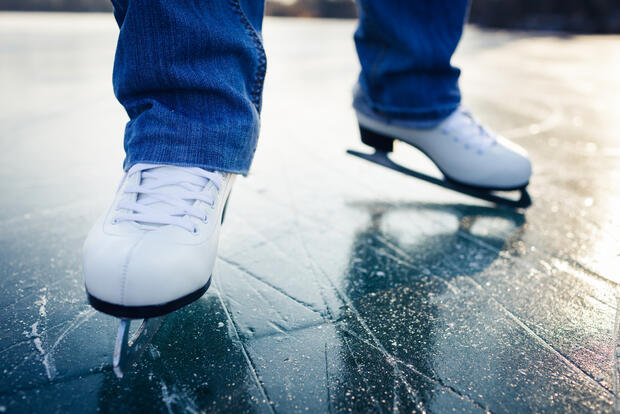Each year, New England residents safely enjoy boating, fishing, ice skating, and ice fishing, but many are injured from exposure to cold water. Skaters and ice fishermen fall through the ice and boaters capsize. Hikers sometimes have to camp overnight in harsh weather conditions. Unleashed pets run onto ice and people chase them. Learn safety tips about cold water exposure.
Ice and cold water safety
Each year many people are injured from exposure to cold water. Learn how to protect yourself and others.
- Always wear a personal flotation device (PFD) when boating.
- Dress properly for cold weather in wool, which insulates better from the effects of hypothermia when dry or wet than man-made materials. Keep your head covered because 50% of body heat is lost through the head.
- The only safe ice is at a skating rink. Ice on moving water in rivers, streams and brooks is never safe. The thickness of ice on ponds and lakes depends upon water currents or springs, depth and natural objects. Changes in temperature cause ice to expand and contract, which affects its strength. Because of these factors, ice cannot be called safe.
Additional Resources
-
Open PDF file, 646.83 KB, Ice and Cold Water Safety (English) (English, PDF 646.83 KB)
-
Open PDF file, 604.94 KB, Ice and Cold Water Safety (Spanish) (English, PDF 604.94 KB)
Hypothermia and cold water
Any water that is cooler than normal body temperature (98.6˚ F) is cold water. Cold water drains away body heat 25 to 30 times faster than air. Cold water does not have to be icy, it just has to be colder than you are to cause hypothermia. The lower the temperature of the water, the faster the onset of hypothermia.
Hypothermia is the extreme lowering of body temperature. Core body temperature below 95˚F causes shivering, confusion, and loss of muscle strength. If not treated and reversed, hypothermia leads to unconsciousness and death. Experts estimate that half of all drowning victims die from hypothermia, not from water-filled lungs.
What to do if someone falls through the ice
- Call 9-1-1 immediately. Properly trained and equipped rescuers will respond.
- DO NOT go out on the ice. Many would-be rescuers become victims themselves.
- Reach, throw or row. Extend a branch, pole or ladder to the victim. Throw a buoyant object such as a life ring or float tied to a rope. If a boat is nearby, row out to the victim or push the boat towards them.
What to do if you fall into cold water
- Get into HELP position (Heat Escape Lessening Position). Bring your knees to your chest, hold your arms to your sides and clasp your hands. Cover your head if possible to protect your body from heat loss.
- DO NOT try to swim unless a boat, floating object, or the shore is close by. Swimming causes warm blood to circulate to your arms and legs, where it cools off quickly and reduces survival time by 35-50%.
- If you are in the water with other people, huddle tightly together with your arms around each other to preserve body heat.
